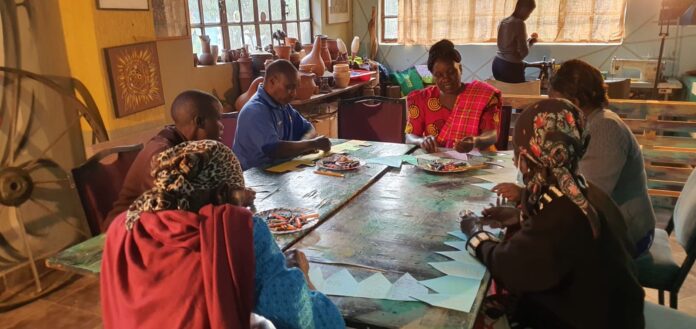By Jackson Okata
Nakuru City, Kenya: In 2022, Deborah Maloba resigned from her teaching post at the Rugunga special school for the mentally challenged in Busia county, 222 miles west of Kenya’s Capital Nairobi over what she describes as “emotional exhaustion and mental fatigue’’. Maloba who had taught at the school for 22 years says that she chose to resign to save her “mental health which was nearing a breaking point’’.
“Being a teacher in a special school comes with an emotional burden. Managing pupils with challenging behaviors for long periods leaves you drained emotionally. The experiences and struggles these students go through will definitely impact you psychologically’’ says Maloba.
According to the mother of three who ventured into farming after quitting teaching, due to the nature of their work and specific environment demands, tutors in special needs schools in Kenya “face a range of mental health challenges with little or no support to get through”.
She says “Working with students who have special needs can be emotionally taxing and more often leads to emotional exhaustion since teachers feel drained from constantly providing emotional support to these pupils but in turn have no one to offer them the much needed post trauma counseling’’.
Maloba notes that apart from being a teacher, she was forced to become a mother to many of her special needs students. “It is not just about teaching them but also nursing them emotionally and physically and being a mother to them and this with time takes a toll on you as a teacher’’.
She says that since 2020, four of her former colleagues have quit teaching in special needs schools due to similar reasons.

Left on their Own
At the Pangani special school for the intellectually challenged in Nakuru county, teachers we interviewed under the condition of anonymity confirmed that despite the demanding nature of teaching in special needs schools, they are forced to contend with often limited resources and psychological support which in turn leads to emotional and mental burnout.
“Teachers feel mentally overwhelmed and disillusioned because our school lacks mental health support structures not only for teachers but also for students who need such support’’ said one of the teachers.
“Many of our students are intellectually challenged and dealing with them is no walk in the park. At the end of the day you feel drained both physically and mentally and this is something you have to do throughout the year’’ added another teacher.
Majority of the teachers we spoke to revealed that they are forced to seek counseling and mental health services privately due to lack of such services within the school system and this comes at a cost.
“When our students and teachers need mental health services, we run to non-governmental organizations for help and in many cases this happens when it’s too late’’ revealed a teacher who has been at the school for the past five years.
Rose Nekesa, a teacher at a special needs school in Bungoma county narrates how some parents dump their children in schools and fail to pick them during closing days.
“Whenever a parent fails to pick their child when schools close, it means that some teachers will be forced to stay back in school and take care of students whose parents fail to show up. This leaves both the student/s and teacher/s stressed’’
“Without counseling, this can throw both the student and teacher into depression and it has happened more often’’ says Nekesa.
Double Burden
Stephanie Wambui (not her real name), is a mother of a mentally challenged 17-year -old boy in Nakuru. In 2023, her son fell into depression while in special needs school but it took the school administration two months to realize that the boy was battling depression.
“The school does not have a guidance and counseling expert yet it is a school of mentally challenged students. I realized something was wrong with my son during a parents meeting but the teachers hadn’t noticed. I sought the services of a mental health expert who later established that my son was battling depression’’ says Wambui.
For Nancy Korir, she was forced to pull her mentally challenged daughter out of a special needs school after she attempted suicide twice.
“When at home my daughter was okay but the moment she went back to school, things would change and she would appear disturbed. All over sudden she started developing suicidal thoughts.”
“There was no qualified counselor at the school to help her out and when I brought her back home, she has since been okay after a psychiatrist attended to her’’ she says.

According to Teresia Odongo (not her real name), a teacher at the Dagoreti special school, lack of functional mental health support systems in special schools often leads to what she describes as compassion fatigue among teachers
“Majority of these teachers are also battling compassion fatigue because of the constant exposure to the struggles and challenges faced by students with special needs. Lack of mental and emotional debriefing sessions for teachers often causes emotional numbness and decreased ability to empathize with their students over time and this affects the well being of the students and the output of the teachers’’ she explains.
Dr. Erica Adagala Korir, a Consultant Psychiatrist observes that there is an existing gap in the provision of mental health services within public special needs schools, something she says affects both teachers and students .
“Teachers in special needs schools may experience high levels of stress due to the complex needs of their students. When a teacher is mentally disturbed, the effect will cut across and the student will also be affected’’ explains Dr. Korir.
According to Dr. Korir, addressing mental health challenges in special needs schools requires a multifaceted approach, including providing teachers with adequate training and support, promoting self-care practices, fostering a supportive work environment, and raising awareness about the importance of mental health in the teaching profession.
“We need established and functional mental health and counseling departments in these schools which should be under mental health specialists who are able to handle such cases when need arises’’ she adds.
Dr Korir warns that most teachers in special needs schools are likely to battle the “feelings of inadequacy” especially when they perceive themselves as unable to meet the diverse needs of their students.
“Witnessing the traumatic experiences of students with special needs, such as abuse or neglect, can have a profound impact on teachers’ mental health. They may experience symptoms of secondary trauma, including intrusive thoughts, anxiety, and sleep disturbances’’ Dr Korir explains..
Government Laxity
With 258 primary and 38 secondary special schools in Kenya, Linda Okero, a mental health champion, agrees that the government has failed in her role of ensuring that students and staff in these schools have easy access to the much needed mental health services.
“Special needs schools should be treated with the special attention they deserve but sadly in our case, the schools are treated as a by the way and it becomes worse when the aspect of mental health gets neglected’’ says Okero.
The Kenya special needs education policy of 2009 requires the government to deploy specialist support staff other than teachers to all special needs schools in the country.
These specialist staff include sign language interpreters, sighted guides, refractionists, braillists, transcribers, readers, physiotherapists, occupational therapists, counselors, orientation and mobility trainers who are supposed to provide professionally recognized services, other than teaching, to learners with special needs and disabilities but this policy guideline according to Okero has been overlooked
The Ministry of Education Sector Policy for Learners and Trainees with Disabilities of 2018 sought to establish an environment that guarantees the health, safety and physiological needs of learners and trainees with disabilities in all special needs schools but the policy is yet to be implemented.
Deputy director of special needs education Abdi Moulia Abdi admits to the existing gaps in the provision of mental health services in special needs schools but says the government is keen to fill the gap by training some teachers and support staff to offer mental and psychological counseling services.
“We have a policy in place that requires us to protect the students and even teachers in these schools from any form of emotional or psychological abuse and it is work in progress’’ says Moulia.
Moulia advises teachers within the schools who are in need of mental or psychological counseling services can as well make use of the Public Service Mental Health Champions Initiative, an program launched in 2023 and which brings together 410 Mental health champions to provide support in counseling services to public servants across the country.
According to data from the Ministry of health, approximately 5, 000 civil servants used to be diagnosed with mental illness per annum before Covid came but this number has since gone up to 13,000 workers owing to the economic conditions existing in the country right now.
Eva Naputuni, Africa Special Needs network chair, argues that the laws in the special education sector are well thought out, but the shortfall comes in when it comes to implementation.
“In a situation whereby only 17,000 teachers are tasked with handling over 300,000 special needs students, cases of mental health issues will definitely be high. These teachers operate under too much pressure and this affects their mental wellbeing’’ she concludes.














